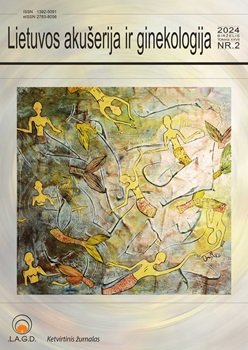EXPLORING POSTTRAUMATIC STRESS SYMPTOMS AND CHILDBIRTH EXPERIENCE IN WOMEN GIVING BIRTH DURING THE COVID-19 PANDEMIC IN LITHUANIA
Abstract
Aim. To investigate the expression of post-traumatic stress symptoms in women who have given birth and to explore their childbirth experiences during the COVID-19 pandemic. Materials and methods. A single-moment descriptive study was conducted from January to July 2021. Full-term women who gave birth to a live newborn within 1–12 months were invited to participate. The study sample comprised a mixed selection, and invitations were distributed in women’s Facebook groups for those who have given birth, Hospital of Lithuanian University of Health Sciences Kaunas klinikos, and the maternity hospital of P. Mažylis in the branch of LSMU Kaunas Hospital. A total of 753 women participated in the study. The City Birth Trauma Scale was employed to determine posttraumatic stress symptoms, accompanied by sociodemographic and childbirth-related questions. Participants were also given the opportunity to respond to an open-ended question regarding the importance of the COVID-19 pandemic on their birth experiences, with 381 women providing their opinions. Differences in posttraumatic stress symptoms according to sociodemographic and childbirth-related indicators were analyzed using the Mann-Whitney and Kruskal-Wallis tests. The association of childbirth-related PTSD symptoms and relationships with health care professionals and partners/husbands was assessed using Spearman's correlation coefficient. Inductive content analysis was employed to analyze qualitative research data. Results. Just over a quarter of women felt that their health or their child's life was in danger during childbirth. Over two-thirds of women in the last week experienced repeated birth-related negative experiences, with almost a quarter avoiding memories related to the birth. A little less than two-thirds had negative feelings related to childbirth, blaming themselves and the environment for the events during childbirth and expressing disinterest in activities. Just over half of the respondents felt agitated in the past week. Almost half of those who experienced at least one of the PTSD symptoms experienced distress and a negative impact of the symptoms on their daily life. 7.97% of women fully met the diagnostic criteria for post-traumatic stress syndrome. Additionally, the research confirmed that a better relationship during childbirth with the healthcare team and the husband/partner was associated with a lower number of post-traumatic stress symptoms. The most significant experiences of women giving birth during the COVID-19 pandemic are characterized by three themes: social isolation and exclusion, physical well-being and psychological state, and communication with healthcare professionals. Conclusion. About three-quarters of study participants who gave birth during the COVID-19 pandemic experienced at least one birth-related PTSD symptom at least once in the past week, and about four-fifths experienced at least one general PTSD symptom at least once in the past week. Women complained of deteriorating physical and psychological well-being, felt isolation and lack of ethical communication with healthcare professionals.

